Disclaimer: In Real Life is a platform for everyday people to share their experiences and voices. All articles are personal stories and do not necessarily echo In Real Life’s sentiments.
Editor’s note: The opinions of the person in this article are entirely his own and IRL does not support his statements. Reader discretion is advised.
Subscribe to our Telegram for updates.
The story I want to share is about how I am currently involved with what seems to be a leadership course called Mind Skills* (Name has been changed for privacy).
I’m not a journalist or a detective, but I’m no fool. After being through Mind Skills and what they taught, I realised that they are engaging in highly unethical business practices.
“I was persuaded by my confident friend to join this Leadership Course”
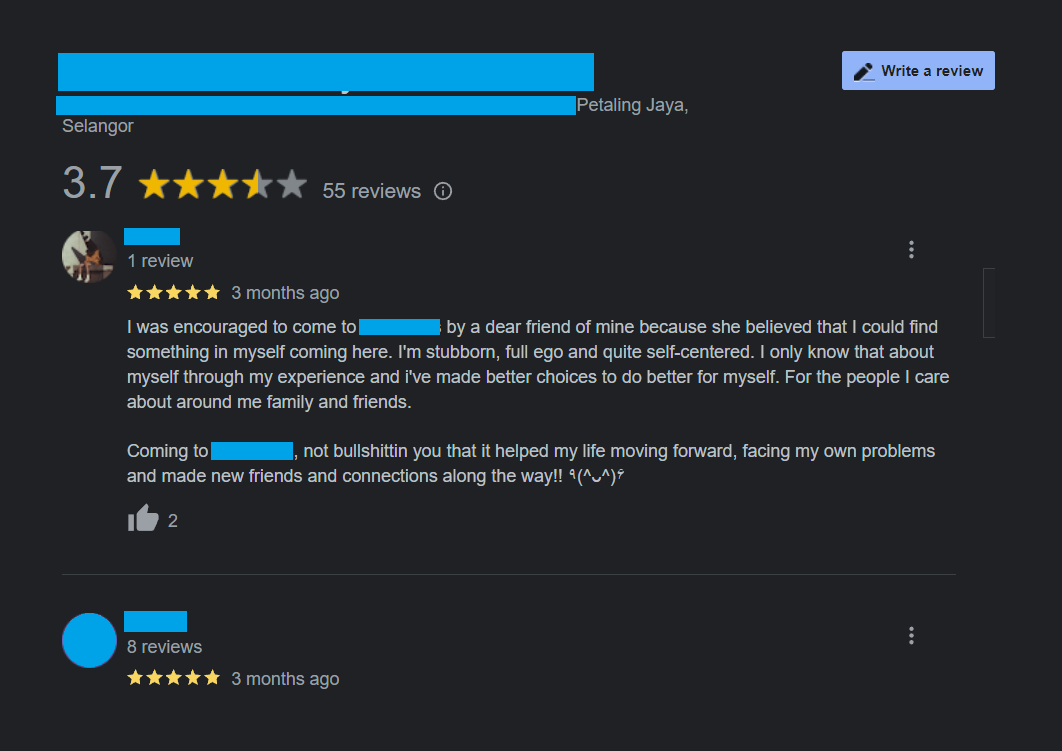
Image: A 5-star Google review left by a user.
I first got involved with Mind Skills because I had noticed a shift in my friend’s personality. Lately, she had become more enthusiastic, confident, involved and open.
One day, she invited me to join this “seminar”. She told me I needed Mind Skill’s seminar to improve my life and to “unlock my full potential”.
At the time, I was recently terminated from my job and down on my luck. And in my current status of life, I believed I needed help.
And seeing how joyful and encouraging my friend was, again, I didn’t want to disappoint her.
So after losing my job and questioning my own life, and being put into that kind of corner by a friend, I foolishly accepted the offer to better my life.
Currently, to join Mind Skills, they have a waiting list until June, but my friend managed to push and pull strings for me to be part of the May intake.
“The first red flag: Their upfront fee was RM2800”
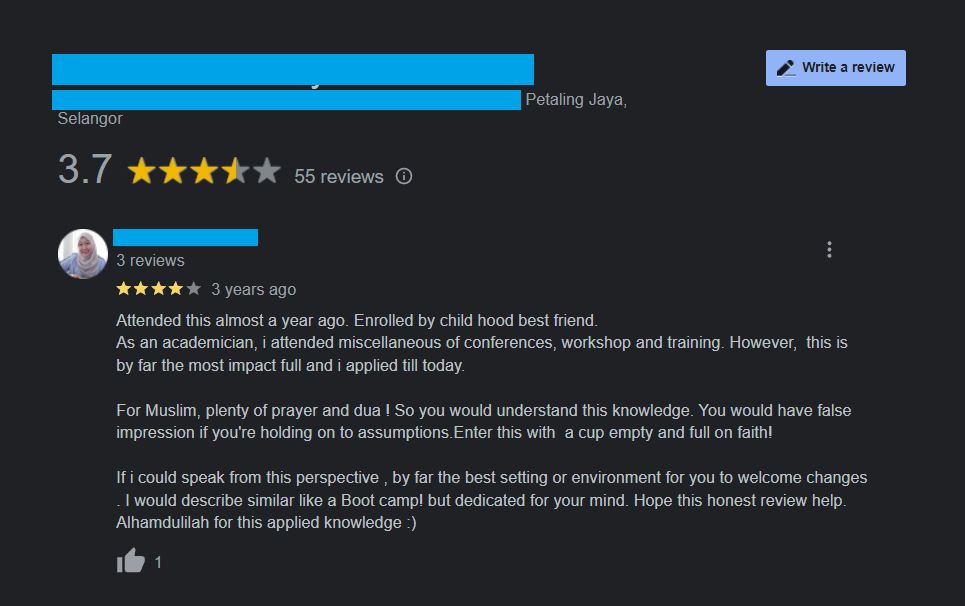
Image: A 4-star Google review left by a user.
The first red flag that I should have noticed was the upfront fee of RM2800. That’s when I should have backed out.
The second red flag that I noticed was a quote she kept repeating: “Trust the process.” I was initially intrigued by it. Sure, why not?
Then came the day of the seminar. They have 3 parts that they break down:
Part 1 is their basic training for 6 days.
Part 2 is their interview process for leadership roles.
Part 3 is their leadership programme which lasts for 85 days.
When I wrote this, I was in part 1 on my fourth day. But in just three days, I’ve seen too many red flags that I needed to tell this story to you guys in hopes it breaks out and people won’t be scammed and exploited.
I really hope my story helps save lives.
“What happened on Day 1 of the basic training”
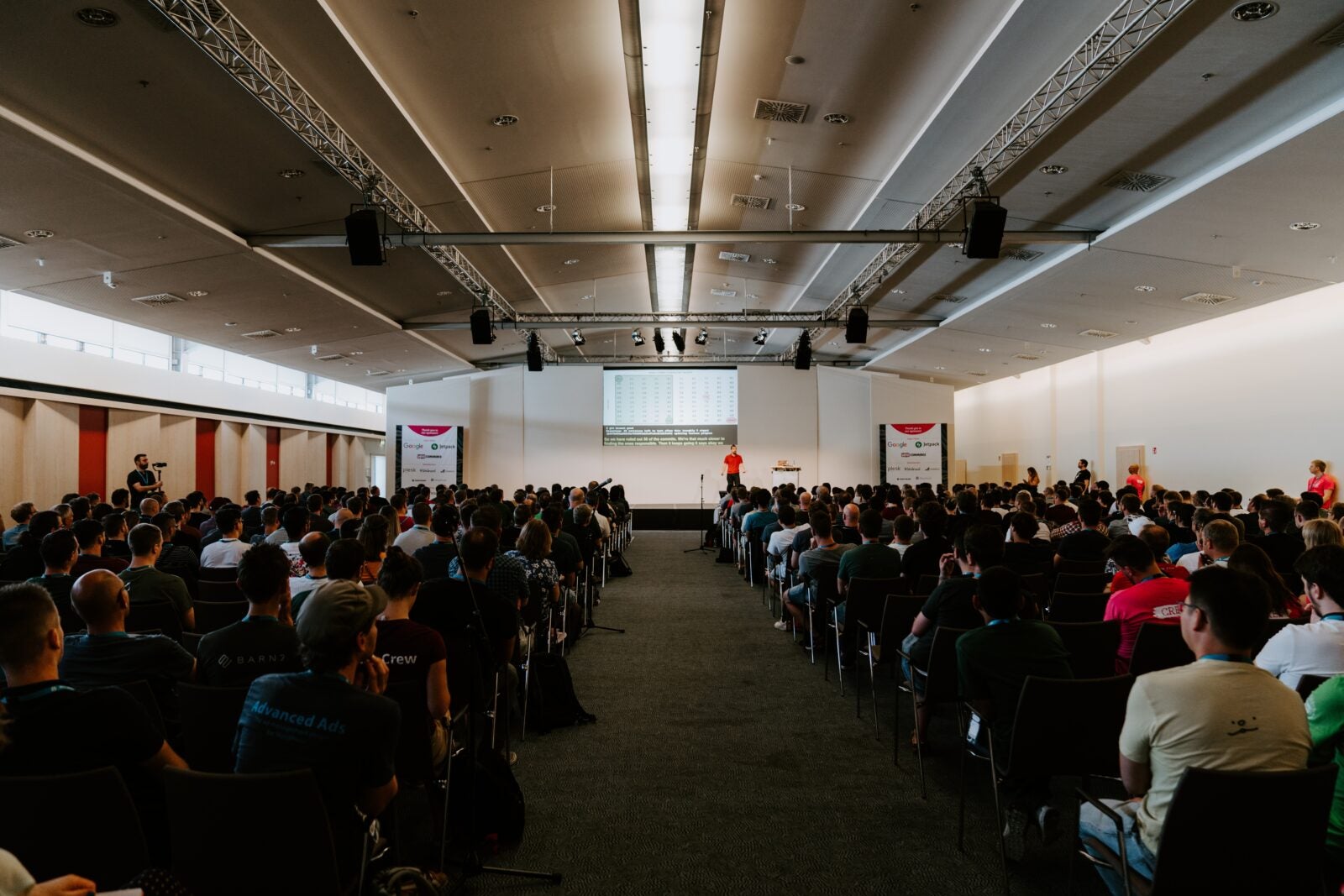
On day one of the Basic Training, the programme started in the evening at 6pm on Wednesday.
We gathered in the training hall and were welcomed by a trainer.
After a small introduction to the programme, they made sure you would follow their ground rules, so that we would trust the process and believe that Mind Skills is a safe place.
Here are a few highlights of their basic rules:
- You aren’t allowed to share or diverge any information from friends, family or anybody from the Mind Skills programme.
- You may only ask questions, talk and share when called on by the trainer or during a designated sharing period. There is no side talk.
- You may not sit next to someone you are friends with prior to Basic Training.
If any of the rules were broken, the trainer would ask you to stand in front of the crowd to acknowledge that you have broken the ground rules, and then ask you to promise not to break the rules again.
“We were asked questions that made us feel isolated from others.”
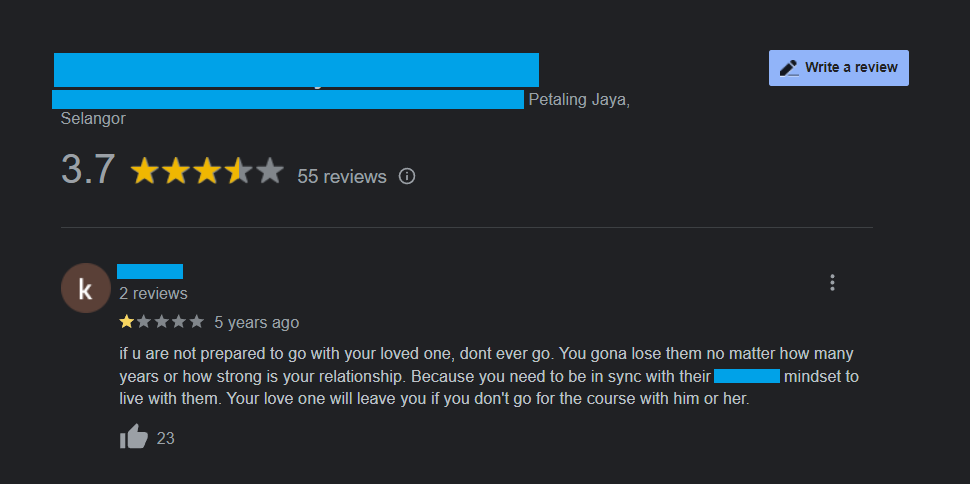
Image: A 1-star Google review left by a user.
We had moments where people were asked to come on stage to share what their purpose was for being in Mind Skills, what part of their lives were they looking into improving.
Then we were asked a series of self-reflective questions that were designed to make us feel uncomfortable.
The second part of the programme involved an exercise where we had to face the random people next to us and say to their faces one of 3 stock phrases:
“I trust you.”
“I do not trust you.”
“I prefer not to say.”
In the first 3 minutes, people casually and politely said the first statement. Before the second half began, the trainer said
“Be honest with yourself: Do you truly trust these random strangers in this room? Do you trust the random people outside? Or are you being nice and not trying to hurt people’s feelings? How is that working out in your life?”
When the second part of the “game” began, people became more forthcoming with their statements, and more responsive and subservient towards the commands of the trainer.
But to me, it was ironic. The trainer had just asked them to question the motives of others around them – how did they end up becoming more trusting of him?
By the end of the night, they put us in a small group of 6 to 7 people. We were assigned to a small group leader, and he gave us some homework to write about the lessons we learnt.
“On the second day, we were instructed to focus on uncovering our past traumas.”
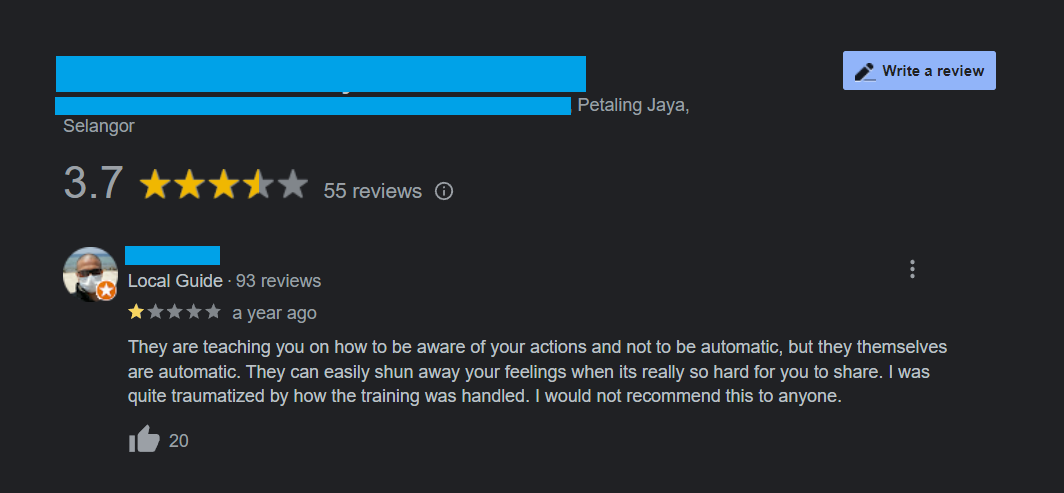
Image: A 1-star Google review left by a user.
On the second day, the trainer focused on our past. We were asked to sit in front of random strangers again and express our childhood relationship with our parents non-verbally.
It was a very strong outpouring session. Many people broke down crying.
I shared about the memories that hurt me the most. It did hurt to express them, but to be honest, the past is in the past. So I didn’t learn anything new.
The second activity was about talking about a vulnerable period in your life where you were a victim from either a relationship, profession or parents.
The trainer explained: “We glorify being a victim, but we’re responsible for the actions in our life.”
“Later, my friend and I both agreed: It felt like we were being scammed.”
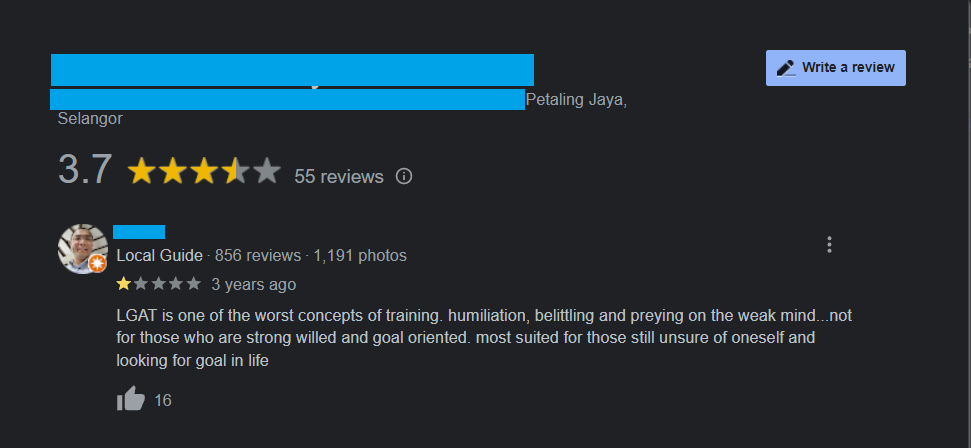
Image: A 1-star Google review left by a user.
After the second night, I went to yumcha (drinking session) with my friend who invited me to the course. At one point, he asked me if I felt like a victim or felt vulnerable during the session.
Straight up, I said: “No, I don’t feel like a victim. I am completely fine with my life as of my current situation. I didn’t feel particularly ‘weak’, and I didn’t learn anything from the day’s lesson.”
I said that because I had done a lot of inner work on my self-progress before. Then we started talking about how we felt about being in the programme.
I was honest and said: “I felt as though it was a scam or MLM. What do you think?”
My friend looked me dead in the eye and said: “Mind Skills feels like a cult. In fact, it follows the patterns of how a cult functions.”
When he said that, it opened up my eyes. We talked about it further, and from that session, I managed to identify the patterns of a cult, and I started to get uneasy.
“The next day, I paid closer attention to what was really going on.”
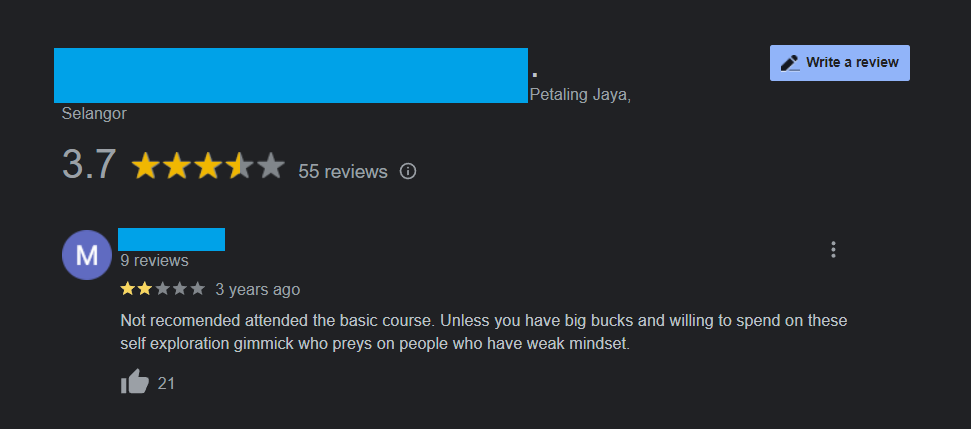
Image: A 2-star Google review left by a user.
The following day, we were meant to update our group leader on what we felt, learnt and what risks or challenges we have to take during the following night’s programme.
On the first day’s update, I told my group leader that I had managed to gain some form of knowledge and value through the programme. She told me she was happy to hear that.
But on the second day, after I had become more aware about Mind Skills being a cult, she asked if I felt vulnerable expressing my childhood trauma.
Being honest with her, I said: “It was hard to relive the past. But I’ve moved on and am in a better place now.”
The second she heard that I was not weak, vulnerable or no longer a victim of the past, she challenged me to be more ‘neutral’ during the 3rd night’s programme.
I entertained her, saying, “I will! I am excited about the night’s event.” But little did she know, I was already very analytical and observant, and I would be watching everything they were doing with fresh eyes.
“On the third night, a woman was ridiculed for having a poor grasp of english.”
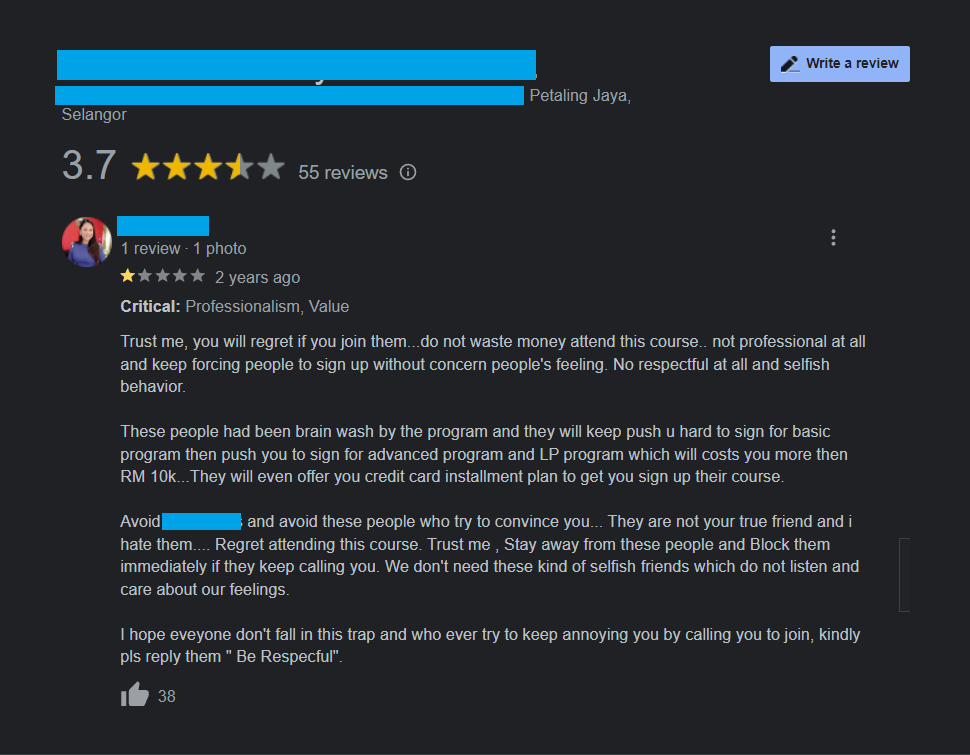
Image: A 1-star Google review left by a user.
So the third night began, and this night turned out to be very eventful.
At the start, the question they posed to us was: In our life, how much intention do we have to fulfill our goals? How many steps does it take to reach our goal?
The life lesson was to always have full intention and commitment and always find any way of means to reach your goals. For example, one platitude they gave was: “To get from point A to point B, let nothing stop you.”
They also said: “People find any form of excuses to prevent themselves from reaching their goals.” Which I agreed with, it is true. But it is nothing new that our teachers, parents, and authority figures haven’t said before.
After our break, a lady came late into the event hall. The trainer was doing his usual, “Do you promise to not break the rules?” skit.
But that poor lady’s understanding of English was limited, so she had come with a man to help her translate.
Instead of accommodating her needs, the trainer didn’t allow the man to help translate Mandarin to English.
He used a lot of professional-sounding words, but the impression he gave was that she had wasted both her time and his time for not being able to understand him for the past two days.
It was like he was ridiculing her for not being able to understand English.
He sent her to talk with the trainer’s assistant, and moments later, she was kicked out of the event.
I felt bad for her.
“Another woman was told she was a victim for yawning because she had woken up early to take care of her baby”
The second event that happened was when the trainer was repeating the ground rules to see how many people had broken the rules.
It was a self reflection of which, if we couldn’t follow these simple rules, then it resulted in your life being the way it is: Bad.
But the trigger point happened when he asked one lady which rule she broke.
She was honest and said: “I yawned during the program.”
He asked her why she yawned.
She answered: “It was because I had to wake up early to take care of my baby and then I went to work –”
He cut her off and asked her if she was playing the victim. She stammered, saying no, I was just explaining why I was tired.
But he didn’t take that for an answer. Through multiple interrogative questions, her browbeat her to admit that she was playing a victim.
Clearly, it was understandable for her to yawn. She was a responsible mother and a working-class adult. Who wouldn’t be tired and yawn?
But he ridiculed her, and I find no justice in that.
“Before the night ended, we played a group activity of a game they called Red and Black.”
We were to split into two groups where the goal of the game was to reach the most points.
Admittedly, telling this part of the story is already difficult without pictures and context but to summarize it:
It went terribly, and rules were broken. The trainer was infuriated. He ridiculed everyone and sent us all home.
Before we packed up and left, he told us that we were forbidden to speak about the Red and Black game to each other at the end of the night. Instead, he told us to self-reflect in shame and silence.
Everyone left feeling uncomfortable.
I was actually a raging monster inside. I couldn’t wait to have a moment where I could shatter the illusion of this cult once and for all.
“It reminded me of the Heaven’s Gate Cult and People’s Temple Cult”
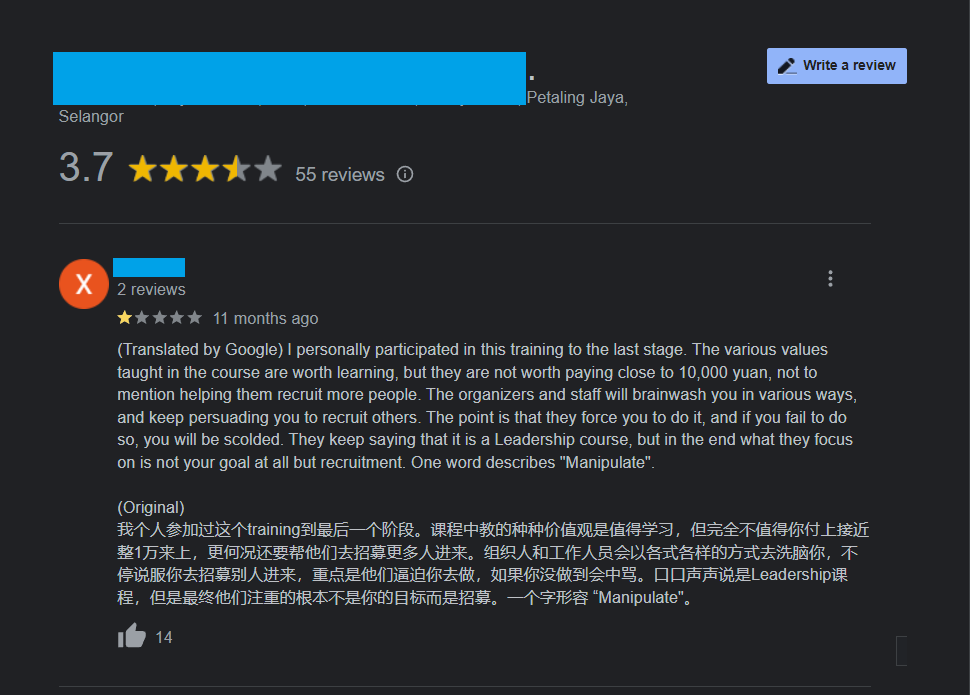
Image: A 1-star Google review left by a user.
Now, here comes the most important part of this tediously long story. I believe Mind Skills is a cult because of how they function.
I’ve watched my fair share of documentaries on cults: the Heaven’s Gate Cult and People’s Temple cult. Here’s what I noticed were the similarities between them and Mind Skills:
Firstly, the timing of the programme targets mentally exhausted workers.
The timing of each session is from Wednesday to Friday, 6pm to 12am. They do that because people would commonly be fatigued by work, personal errands, daily activities and studies.
They ensure that when people come to the programme, they are already tired and won’t be able to think much and in hopes to mold your brain right after a hard day.
Commonly, when people are tired and a participant in a group, they wouldn’t give it a second thought and go along. And that’s exactly what we did.
Secondly, they prey on people with traumatic pasts and vulnerabilities to exploitation.
During the training, we are being fed information that this is a safe place to open up. So, we are put up on stage and expose our most traumatizing experiences, uncomfortable relationships and other difficult topics.
They do that to deconstruct and reconstruct the victims to “trust the process”. But the victims do not realize that they are putting their faith in people who want to turn them into sheep.
Throughout the various activities, we were constantly made to explore our past trauma and relationships. We were reminded of the neglect, abandonment, pain and suffering we went through.
After all that, they would ‘shape us up’ by saying: “This here is a safe place, this is the moment in your life where you will be a better you.”
Essentially, our emotions and thoughts were being manipulated from the beginning.
Thirdly, their ground rules are for discipline, but really they’re meant to control us.
The purpose of the ground rules, according to Mind Skills, is to create a sense of discipline. We have to trust their system, as my friend repeated to me, “trust the process” because the ground rules are set in place to “self-reflect on our lives.”
But to me, this was all lies. The real reason for these rules is to ensure they have authority over us, so that no one would step out of line and go against their system.
Their modus operandi is to pick on us when we are fatigued, weaken us by exposing our vulnerable moments, and putting us in their grip with their strict ground rules.
I see some people have fallen victim to this and become sheeps. But their grave mistake is me, because I am the wolf amongst sheep.
“I decided to tell the world about Mind Skills to save others from my mistake in trusting them”
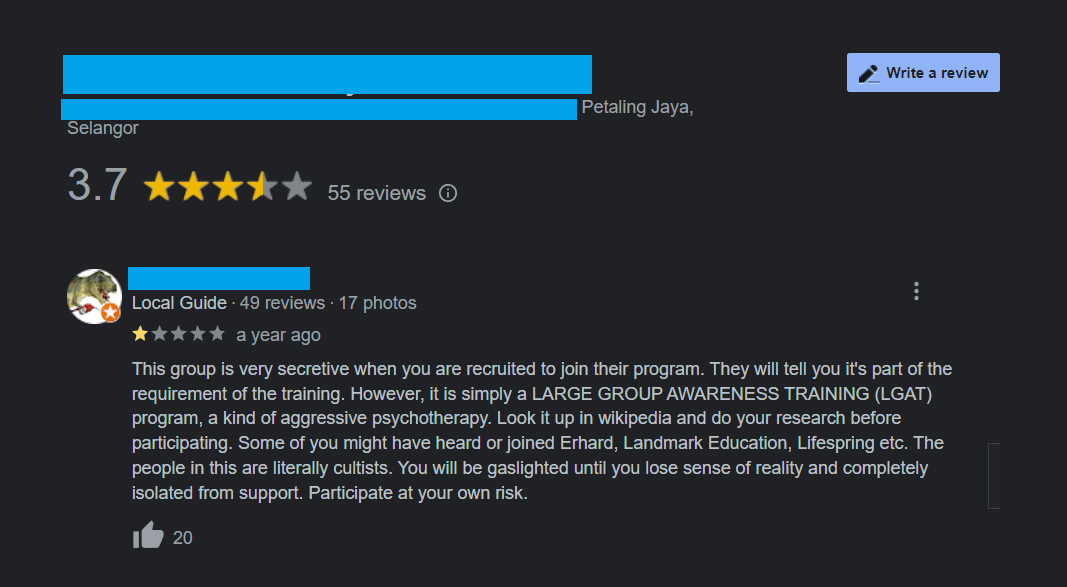
Image: A 1-star Google review left by a user.
I am here trying to expose this cult mainly because I see them for what they are, exploiting people’s emotions and extorting people out of thousands of ringgit for them to reap the benefits.
I’ve already wasted RM2800 on such a useless training programme.
I don’t know whether I’ll be able to get the money back, but if I’m able to save the people in that room, all 113 people including me and my friend, then money is well spent.
Mind Skills is shameless in what they are doing. I pity the people who don’t see the facade that is happening in front of them. I want this story to open people’s eyes, and to break the chain of abuse they put on people.
There are genuine people that I’ve met there. They don’t deserve to be exploited. They have to be saved.
On the 15th of May, there was the 2nd part of their programme, where they hard sell people into paying for a leadership programme.
Essentially, in this programme, the people are asked to do various more tasks to do voluntary work.
But to me, they were just using the experience of the 5 days we were with them to manipulate us into joining the leadership programme.
I understand the story I just shared is a very long and arduous process, but it’s all in good faith.
Because unlike most people involved in the programme, I am not weak, I am not blinded, I won’t be a sheep. And I want to save these poor, genuine people from making any form of regrets.
Thank you for taking the time to read this story. I would feel guilty if no action was taken by me.
P.S. As of now I would like to remain anonymous for reasons to protect a friend I know that is involved in this cult.
A note about Mind Skills and Large Group Awareness Training (LGAT).
IRL would like to provide some background information on Large Group Awareness Training (LGAT) programmes such as Mind Skills.
According to Wikipedia, Large Group Awareness Trainings are a type of group training session where participants join in group exercises. These are supposedly meant to break down the conventional ego, after which they are in effect born again.
After being born again, they are supposedly more confident and more mentally strong.
The topic of whether LGATs are truly “abusive” is not fully understood. LGATs have been accused by psychologists of employing many elements of cognitive manipulation which leave people more easily vulnerable to persuasion.
However, unlike the legal definition of what makes up a true “cult”, there is no requirement to live together and isolate themselves from society. People are free to leave as they wish.
IRL has reached out to the company in question for comment, but they have elected to decline to add their perspective to this article.
What do you think about this story? Let us know in the comments!
For more stories like this, read:
Do you have an interesting story? Email us at ym.efillaerni@olleh
You might also like
More from Real Skills
How I Saved Almost RM50,000 On Buying My First Car
Here's how this Malaysian man with a RM3,500 salary saved RM50,000 on his first car.
Angry M’sian Boss Demands Unpaid Overtime Over Raya, Causes 9 Staff To Quit
An anonymous employee at a local SME shares how a bad-tempered boss eventually caused 9 staff to quit before Hari …
I Studied In Chinese School As A Malay Boy, Here’s What I Learnt
Every time I used Mandarin outside of school, family members would come up to me at gatherings and ask me …

















